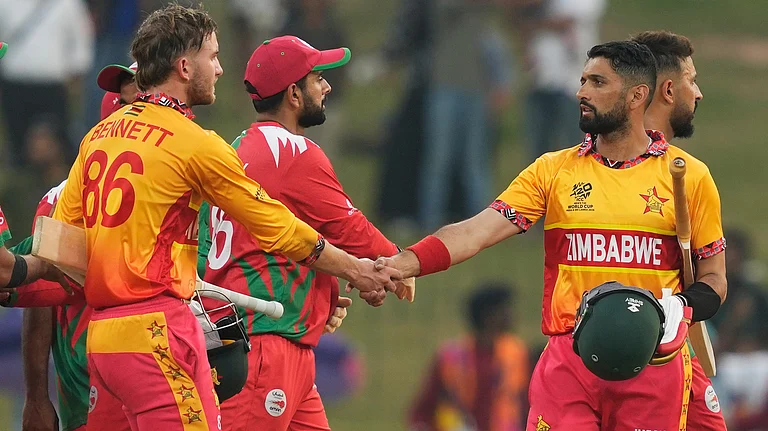What makes Kerala difficult for the BJP? It seems India’s ruling party is beginning to address the vexed question ahead of assembly elections in the LDF-ruled state. One sign is Union home minister Amit Shah’s reference to Kerala as a land of social reforms in his speech at an election rally in state capital Thiruvananthapuram. “It had a different tenor, not aggressive like his speech in West Bengal. The BJP has learnt that its usual recipe of communal rhetoric wouldn’t help in Kerala,” says D. Dhanuraj, chairman of Centre for Public Policy Research.
In his speech, Shah exhorted people to break out of the old pattern of voting the CPI(M)- and the Congress-led fronts to take turns at power in the state. Bringing in credible faces such as 88-year-old technocrat E. Sreedharan seems to be part of the BJP’s effort to forge a new language of politics tailormade for Kerala, where its voteshare has grown from 10.5 per cent in the 2014 Lok Sabha elections to 15.56 per cent in 2019.
ALSO READ: Operation Akhil Bharatiya
According to political observer Joseph Mathew, the BJP has expanded its social base in Kerala over the years and it’s no longer taboo to be associated with it. “A popular face like Sreedharan will bring the party more acceptance in a society where it was once treated like a political untouchable. Whether his reputation can also bring in the votes is difficult to predict as Malayalis are not known for hero worship,” says Mathew.
While the April 6 assembly elections will be an acid test for the main players in the fray—the CPI(M)-led LDF and the Congress-led UDF—it will be more of a prestige issue for the BJP. The party’s drubbing in the local body elections held in December hasn’t dampened the spirits of its leaders. “In Tripura, we went from zero seats to becoming the ruling party, and here too we are confident of winning 35-40 seats and forming the government,” says BJP state president K. Surendran. “There will be an exodus from the Congress, the CPI(M), the IUML and others to the BJP after the election.”
ALSO READ: Like Gold In A Furnace

Surendran sounds too optimistic, given that his party’s voteshare went up by a minuscule 0.5 per cent from 15 per cent in the 2016 assembly polls to 15.5 in the 2020 local body elections. “The party doesn’t have a charismatic, strong and articulate leadership in Kerala,” says Dhanuraj. “The state unit lacks imagination and has only tried to copy BJP leaders from the North.” There have also been instances of infighting, which have come out in the open. This time, the state leadership’s U-turn after announcing Sreedharan as the CM candidate has exposed a chink in the party’s armour. “The confusion was created by the media, but Amit Shah has hinted at the Thiruvananthapuram rally that Sreedharan will be the CM candidate,” says Surendran.
ALSO READ: Nandigram, Ground Zero
Meanwhile, Sobha Surendran, a senior BJP leader in Kerala, has approached the central leadership about her differences with the state unit. “I have shared certain concerns regarding the organisational structure. The party president (J.P. Nadda) has assured me that he has taken my concerns into consideration,” she says.

Almost total lack of support from the minority communities is another major hurdle in expanding the BJP’s foothold in the state. For the saffron party, whose core social base is among the Nair community, influencing Muslims and Christians, who comprise 45 per cent of Kerala’s population, is an uphill task. Moreover, the party’s equation with the influential Ezhava community ran into rough weather after it broke up with the Bharath Dharma Jana Sena. With its attempts to consolidate the Hindu votes (approximately 55 per cent) failing to bear fruit, the party as a last resort has now set its eyes on various denominations of Christians, who together comprise 18 per cent of the population.
ALSO READ: Brahmaputra’s Undertow
However, Prof Sajad Ibrahim, a political scientist, says the party won’t be able to persuade many Christians to vote for it. “More than ever, the 2021 election will be fought on communal lines by all political fronts. I have never seen such a scenario. The LDF, the UDF and the BJP are all canvassing on communal lines,” he says.

Kerala CM Pinarayi Vijayan
Last week, a meeting between senior bishops of the Malankara Orthodox Syrian Church and RSS leader Manmohan Vaidya in Kochi set off a rumour that the church is extending support to the BJP for the assembly polls. Prime Minister Narendra Modi met heads of the Orthodox and Jacobite Syrian churches earlier in Delhi to settle an old property dispute between them. The Jacobite Syrian Church, which had earlier taken a pro-LDF stand, has now changed tack.
ALSO READ: Saffron Spritz In Dravida Land
“We leave the field open now,” says its spokesperson Kuriakose Mar Theophilose. “Our people will vote for whichever party protects our churches and helps get justice for the faithful, even if it’s the BJP. It concerns us that Christians are deprived of the benefits of minority welfare schemes. It is also perceived that the IUML is controlling the Congress at times. It’s the responsibility of governments and politicians to fix such problems rather than create communal issues out of them.”
ALSO READ: Dry Run In Wet Pondicherry
Many believe the church heads are bowing to pressure from the BJP government at the Centre with the sword of the Foreign Contribution (Regulation) Act hanging over their heads. “The church heads are under pressure because they receive unaccounted funds from foreign countries. If there is a probe, it will adversely affect them. But devotees are aware of it,” says Felix J. Pulludan, president of the Joint Christian Council. Cibu Irimbinical of the Kerala Catholic Bishops Council says devotees are sufficiently politically literate to choose their ideology and exercise their rights. “Meetings may have happened between bishops and political leaders, but we haven’t adopted a favourable position towards any party. Discussions among communities are always good for the democratic process,” he says.
ALSO READ: A Big If In Its Ifs And Buts Tides
The BJP also expects that its efforts to raise issues such as ‘love jihad’ and the conversion of Hagia Sophia in Istanbul, Turkey, into a mosque will resonate with the Christians in Kerala. However, former spokesperson of the Syro-Malabar Church, Fr Paul Thelakkat, says ‘love jihad’ is a bogey raised by “politically motivated hate-mongering groups against a particular community”. Political commentators believe that any communal polarisation will help the BJP in the long run to become a force to reckon with. “Now even the minority communities have started recognising the BJP. By the next election, the party may be looking at 15 seats and it will grow at the expense of the Congress. Many in the Congress are ready to join the BJP camp,” says Prof Ibrahim.
According to an RSS leader, who didn’t wish to be identified, the BJP may not make any inroads this time, but aims to gain substantially in the 2024 Lok Sabha polls in the state that has the highest number of shakhas in the country. “In West Bengal, the BJP first used Mamata Banerjee to wipe out the Communists, and then spread its wings in the state. The party is waiting for a similar opportunity in Kerala. It wants the CPI(M) to stay in power and expects the Congress to be decimated so that the BJP can grow at its expense,” he says.


























